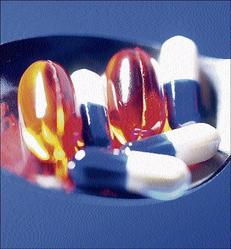Charlyn Fargo, Contributor

If you're over 50, chances are you aren't getting the recommended amounts of vitamins and minerals from food alone, according to a new study from the U.S. Department of Agriculture. The simple answer is to take supplements, but the study found that only about half of those in the over-50 age group take supplements daily.
The study was published in the August 2007 issue of the Journal of the American Dietetic Association. Researchers analysed data on 4,384 Americans over the age of 50 from the 1994-1996 Continuing Survey of Food Intakes by Individuals and Diet and Health Knowledge Survey.
The group included 1,777 daily supplement users, 428 infrequent users and 2,179 non-users. Daily supplement users were significantly more likely to meet the Estimated Average Requirements (EAR) for vitamins A, B6 and C, folate, zinc and magnesium than those relying on diet alone. Among daily supplement users, 80 per cent or more met the EAR for vitamins A, B6, B12, C and E, folate, iron and zinc, but not for magnesium, even with the help of pills.
The USDA team concluded that a large proportion of older adults do not consume sufficient amounts of many nutrients from foods alone, and while supplements can compensate, only half of the over 50 population takes them daily.
Source: Tufts University Health & Nutrition Letter.
Winning question
Q: Is the glycaemic index (GI) a good way to lose weight and monitor diabetes?
A: The glycaemic index has recently gained attention as a possible tool for controlling appetite and managing weight and blood glucose levels. The glycaemic index has remained a controversial subject since its development more than 20 years ago.
At this time, research does not support the claim that a low GI diet causes significant weight loss or helps control appetite. For people with diabetes, monitoring total grams of carbohydrate remains the key strategy. However, some individuals with diabetes might be able to use the GI concept, along with blood glucose monitoring, to 'fine-tune' their food choices to produce a modest improvement in post-meal blood glucose levels.
- American Dietetic Association.
Christmas dinner idea
The December issue of Cooking Light magazine offers this recipe for Maple-Balsamic Glazed Pork Medallions that are fancy enough for company, yet easy enough for a busy holiday schedule.
MAPLE-BALSAMIC GLAZED PORK MEDALLIONS
1/4 cup maple syrup
3 tablespoons balsamic vinegar
2 teaspoons Dijon mustard
1 (1 pound) pork tenderloin, trimmed
2 teaspoons olive oil
1/2 teaspoon salt
1/4 teaspoon freshly ground black pepper
Yields 4 servings.
Combine syrup and vinegar in small saucepan; bring to a boil. Cook until reduced to 1/3 cup (about 3 minutes), stirring occasionally. Remove from heat; stir in mustard.
Cut pork crosswise into 8 slices. Place each pork slice between 2 sheets of heavy-duty plastic wrap; pound meat to 1/4 -inch thickness using a meat mallet.
Heat oil in large nonstick skillet over medium-high heat.
Sprinkle pork evenly with salt and pepper. Add pork to pan; cook 3 minutes per side. Add vinegar mixture; cook 1 minute or until desired degree of doneness, turning pork to coat.
Place 2 pork medallions on each side of 4 plates; drizzle about 1 tablespoon syrup mixture over each serving.
Nutritional analysis per serving: 214 calories, 22.7 g protein, 15.3 g carbohydrate, 6.4 g fat, 63 mg cholesterol, .1 g dietary fiber, 409 mg sodium.
Visit Copley News; www.copleynews.com.

